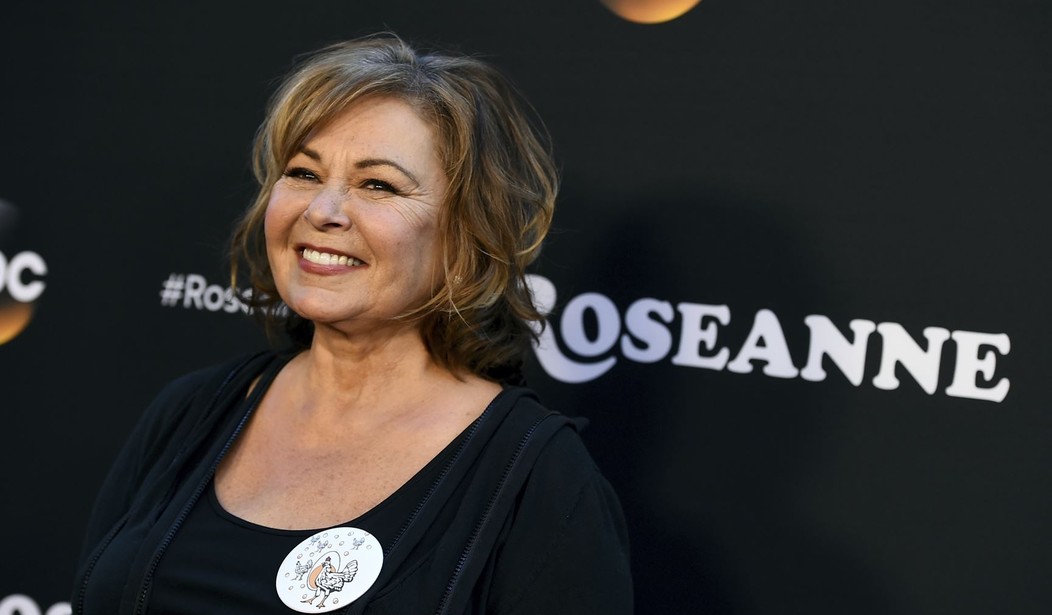When ABC persuaded Roseanne Barr to star in a re-boot of her iconic television show in 2018, it was enormously popular. However, she and her television persona very much supported President Trump. This is how Roseanne became the first and biggest victim of “cancel culture”. Barr tells the story of how her Tweet about Valerie Jarrett unjustly got her show and Roseanne herself “canceled” from Hollywood.
Documentarian Joel Gilbert has produced many interesting documentaries, which take deep dives into figures who have crossed Americans’ field of vision—from Barack and Michelle Obama to Trayvon Martin to Al Gore. I always come away from these life reviews much more knowledgeable about the subjects and often with a changed perspective.
In his latest documentary, Roseanne Barr Is America (trailer available here), Gilbert does his typical in-depth research on his principal subject, but unlike his other movies, this one relies very heavily on interviews of the subject herself. Typically, Ms. Barr doesn’t hold back.
Roseanne’s humor might not be everyone’s cup of tea, but watching Gilbert’s film, I came away with an appreciation for the woman’s unique genius and ability to tap into the sensibilities of a wide swath of middle America.
Gilbert devotes the first half of his documentary to detailing Ms. Barr’s biography, which is, to say the least, unconventional.
Roseanne tells the interviewer, “Since God has an incredible sense of humor, I was born as an orthodox Jewish girl in Salt Lake City, Utah, of course!” Salt Lake City is the center of America’s Mormon community, which until recently comprised over half the population. Ms. Barr notes that she was a dark-haired, chubby Jewish girl who grew up among light-haired, Norwegian-looking Christian kids.
Recommended
She was a self-professed “red diaper baby,” whose family was ardently socialist in its political outlook, and her father a fan of the Russian Marxist, Leon Trotsky.
While she says she grew up “in a very funny family,” Roseanne describes her father as someone who could be physically and emotionally abusive, but was also a powerful influence on her development. He loved to watch the popular television comics of the day, like Lenny Bruce, whom her family considered a “god.” Her father would critique them for young Roseanne, who loved being the center of attention herself.
The film takes us through Roseanne’s struggles as a teenager. She suffered a head injury following a car accident at sixteen, which her mother said altered her personality. Her superb grades in math declined. She would abuse alcohol with friends, act out, and be committed for a time by her parents to a mental hospital. Later, she became pregnant and was sent to a home for unwed mothers to give birth to her first child.
In the late 1960s, she lived with other “hippies” in a commune. While working as a cocktail waitress, someone suggested that she try her hand at stand-up comedy. Roseanne gave it a shot and discovered her unique talent for making people laugh with irreverent humor, drawing largely on her “unusual childhood,” as she describes it, as source material. She delivered what she describes as “radical feminist” humor, and it found an audience.
Roseanne’s big break came when she was asked to appear at The Comedy Store in Los Angeles in the 1980s. That led to her booking in 1985 on the Tonight Show with Johnny Carson, whose imprimatur sent Roseanne’s rocket ship into orbit. She landed an 18-city tour with singer Julio Iglesias, TV commercials, a comedy album, and HBO specials. Those led to her smash television show, Roseanne, which would run from 1988 to 1997, with stellar ratings.
Ms. Barr’s compelling description of the behind-the-scenes intrigue and warped personalities that populate Hollywood. Her characterization of the professional, Harvard-educated elitist writers and producers she worked with on the show, who sought to control her, and their complete disdain for their middle America viewing audience, is eye-opening.
The second half of the film is even more compelling, in which Roseanne describes her political evolution – from “red diaper baby” socialist hippie to freedom-loving American patriot and Donald Trump supporter. In fact, it was her very vocal support of Trump, which seems to have largely damaged Ms. Barr’s television career. When Roseanne ran for president in 2012, she married up politics and comedy for the first time in American presidential history. She was happy to add Donald Trump, but then took it to another level.
In a time when common sense is ascendant in America, and the Democratic Party veers increasingly off the rails with its radical policies, it is refreshing to hear Ms. Barr’s voice as one who was from that world, but came to see the light.
Roseanne Barr Is America is a fine new contribution to the story of America, and a worthy and entertaining tribute to a uniquely creative, enormously talented self-made American icon.
William F. Marshall has been an intelligence analyst and investigator in the government, private, and non-profit sectors for 38 years. He is a senior investigator for Judicial Watch, Inc., and has been a contributor to Townhall, American Thinker, Epoch Times, The Federalist, American Greatness, and other publications. His work has been featured on CBS News' 48 Hours and NBC News' Dateline. (The views expressed are the author’s alone, and not necessarily those of Judicial Watch.)

























Join the conversation as a VIP Member